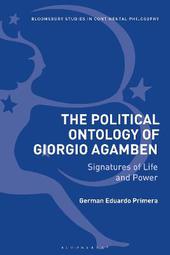
|
The Political Ontology of Giorgio Agamben: Signatures of Life and Power
Hardback
Main Details
Description
With the publication of The Use of Bodies (2016), Agamben's multi-volume Homo Sacer project has come to an end, or to paraphrase Agamben, has been abandoned. We now have a new vantage point from which to reread Agamben's corpus; not only his method but his political and philosophical thought can been seen in a clearer light. This timely book both assesses and contributes to the debates on the Homo Sacer project in its entirety. Rethinking the notions of life and power - two of the central themes in Agamben's work - through a reconstruction of his philosophical method and an examination of his critique of Western metaphysics, this book argues that Agamben's thought cannot be fully grasped if we do not account for the intertwining of politics and ontology. This book argues that it is only by revisiting Agamben's critique of signification and metaphysics and examining his reconstruction of the archaeological method that we can understand his notions of life and power. By bringing together the two parts of the Homo Sacer project - the archaeology of the signature of Sovereignty and the archaeology of governmentality - this book provides an analysis of the production of Agambenian 'bare life'. In this sense this project re-articulates Agamben's works on signification, language and ontology with his archaeology of power. Offering an original examination of Agamben's notion of resistance, this is essential reading for any thoughtful consideration of his philosophical legacy.
Author Biography
German Eduardo Primera is Lecturer in Philosophy and Critical Theory in the School of Humanities, University of Brighton, UK.
ReviewsGerman Primera's engaging work uses the recent completion of the Homo Sacer project as an occasion to assess Agamben's work in its entirety. Demonstrating how the early writings on metaphysics and signification inform later discussions of sovereignty, theology, governmentality, power and life, it shows how the ontology of signatures and paradigms underpinning Agamben's philosophical archaeology form the threads that cross the whole arc of his thinking, cashing themselves out in a politics of inoperability and destituent potency. Combining close engagements with contemporaries such as Foucault, Derrida and Negri, and answering a multitude of critics, Primera establishes Agamben's distinctive place in post-Heideggerian political philosophy. * Nathan Widder, Professor of Political Theory, University of London, UK * One of the very few genuine attempts to understand Agamben's work philosophically: by means of a careful, precise, and absolutely lucid reconstruction of his thought, which only an exceptional familiarity with the whole corpus would allow, Primera throws new light on the very deepest of its structures. These structures are rendered visible by a return to one of the earliest moments of Agamben's mature work: the critique of signification and the sign. This return is made in such a way as to allow Primera to carry out a deeper excavation of the foundations of Agamben's conceptual architecture than we have ever seen before. * Michael Lewis, Lecturer in Philosophy, University of Newcastle upon Tyne, UK * A clear, inspiring, and beautifully written investigation into Giorgio Agamben's philosophy understood as a critique of Western metaphysics aimed at rendering inoperative the signatures that control the intelligibility of Western politics and culture. In dialogue with Derrida, Foucault, Negri, Schmitt, and Benjamin, the book underscores the significance of Agamben's work for both a critique of and a contribution to current debates on neoliberalism, biopolitics, governmentality, and sovereignty. * Silvia Benso, Professor of Philosophy, Rochester Institute of Technology, USA *
|